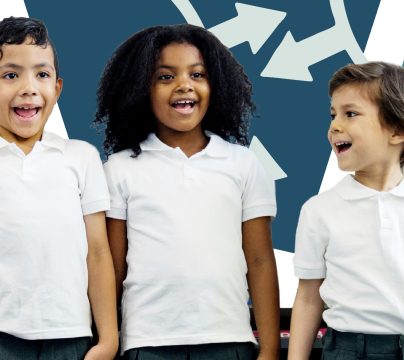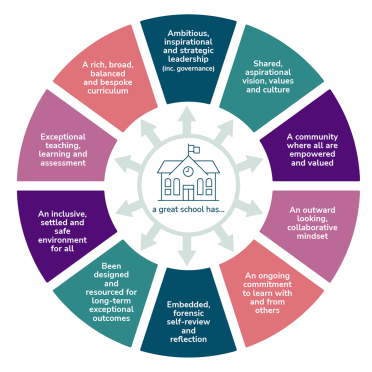A great school’s curriculum instils in children a love of learning and supports the acquisition of knowledge and understanding. Its intent is to develop learning skills and to foster positive character traits. It supports the growth of lively, enquiring minds and pupils’ ability to question and argue rationally. Great schools have a clear and bespoke curriculum vision. They are able to meet the needs of the accountability framework whilst being imaginative, brave and creative in their approach to designing their own bespoke educational provision.
The curriculum is carefully and purposefully designed in a coherent and sequenced fashion which meets the needs of pupils. It takes each pupil from the desired end point for students in the school (whichever key stage that may be) backwards - and builds up incrementally from pupils’ starting points and experiences.
A great curriculum helps pupils to understand the world in which they live, and the interdependence of individuals, groups and nations, enabling them to enter the wider world as active and responsible participants in society. It provides pupils with the opportunity to learn, practise and apply skills that will prepare them for careers in a fast-changing world. Pupils are provided with cultural opportunities beyond their prior experience which widen their horizons: trips, activities, visitors, speakers, fieldwork, extra-curricular sessions and other activities that enhance learning.
A great curriculum provides memorable experiences and rich opportunities for high-quality learning and wider personal development.
This lens will typically be reflected in:
- School vision/mission statement
- Curriculum Policy
- Phase/subject curriculum handbooks/ statements
- Subject policies e.g. PSHE, RE, Collective Worship, Literacy, Numeracy, SRE
- Cultural Passport/Student Pledge
- Curriculum map/structure/diagram
- Extra-curriculum/enrichment policy and programme
- Work Related Learning Policy
- Schemes of learning, long and medium term plans, lesson plans
- Subject team meeting minutes, co-planning documentation and SoL reviews
- Trips, visits and speakers records
- Displays and learning environment, range and quality of resources used
- Destinations data
- Calendar of key events e.g. concerts, plays, sports days
- Community projects
General documents, policies and procedures in which you might typically see the lenses reflected.
Case studies
Resources
-
Summer 2021
Back on Track: Fewer Things, Greater Depth – Mary Myatt, 2020
The Curriculum: An Evidence Informed Guide for Teachers - ed Clare Sealy, 2020
Secondary Curriculum Transformed – Meena Wood & Nick Haddon, 2020
Curriculum to Classroom: a handbook to prompt thinking around primary curriculum design and delivery - Lekha Sharma, 2020
Christine Counsell’s blog: ‘the dignity of the thing’ https://thedignityofthethingblog.wordpress.com/
Working with the revised EYFS – Principles into Practice - Julian Grenier, 2020
Interacting or interfering? Improving interactions in Early years – Julie Fisher, 2016
Spring 2020
The Primary Curriculum Leaders' Handbook - Edited by Roy Blatchford, 2019
The Secondary Curriculum Leaders' Handbook - Edited by Roy Blatchford, 2019
The Monkey-Proof Box: Curriculum design for building knowledge, developing creative thinking and promoting independence - Jonathon Lear, 2019
Teachers Vs Tech? The Case for an Ed Tech Revolution - Daisy Christodoulou, 2020
Christine Counsell's blog - the Dignity of the Thing: https://thedignityofthethingblog.wordpress.com/
Why Students Don’t Like School - Daniel T Willingham
From Gallimaufry to Coherence - Mary Myatt 2018
Education Inspection Framework - overview of research
HFL Reading Fluency Project - KS1-KS4
Autumn 2019
National Trust’s 50 things to do before you are 11 3/4
Whole Education Curriculum Development
Out of Our Minds: The Power of Being Creative - Ken Robinson, 2017
Curriculum: Gallimaufry to Coherence - Mary Myatt, 2018
The Learning Power Approach - Teaching learners to teach themselves: Guy Claxton, 2018
The secondary curriculum leader’s handbook - Roy Blatchford et al, 2019
The primary curriculum leader’s handbook - Roy Blatchford, 2019

Ways in which HFL can provide support
Primary curriculum conferences
Secondary curriculum conferences
Foundation subjects and curriculum design support
PA Plus subscription - Primary National Curriculum planning, assessment and progress-tracking
Standards Visits: focus on curriculum intent, implementation and impact
Curriculum planning and costing - Financial Services
Please contact us for further information on 01438 544464 or email info@hfleducation.org
The Great School Framework is made up of:
Ambitious, inspirational and strategic leadership (inc. governance)
Shared, aspirational vision, values and culture
A community where all are empowered and valued
An outward looking, collaborative mindset
An ongoing commitment to learn with and from others
Embedded, forensic self-review and reflection
Been designed and resourced for long term exceptional outcomes
An inclusive, settled and safe environment for all
Exceptional teaching, learning and assessment
A rich, broad, balanced and bespoke curriculum
The Great School Framework is the intellectual property of HFL Education and copyrighted. It may not be used unacknowledged by others.


